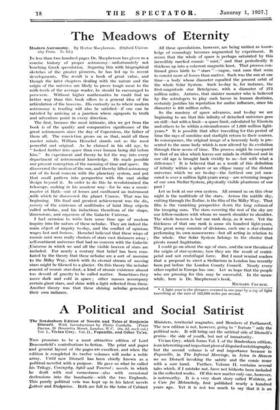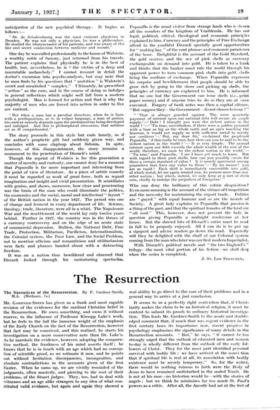A Political and Social Satirist
Iritis promises to be a most attractive edition of Lord Beaconsfield's contributions to fiction. The print and paper
and general layout of the pages are excellent, and when the edition is completed its twelve volumes will make a noble array. Until now Disraeli has been chiefly known as a
political novelist with a purpose. He gave us what he called his Trilogy. Coningsby, Sybil and Tancred ; novels in which he dealt with real earnestness—also with occasional declensions into the bombastic—with the two Englands. This purely political vein was kept up in his latest novels ,T,olhair and Endymion. Both are full to the brim of Cabinet Ministers, territorial magnates, and Members of Parliament; The new edition is- not, however, going to " feature " only the political note. It will bring out the satirical side of Disraeli's genius—the side of youth, but not of immaturity. Vivian Grey, which forms Vol. I. of the Bradenham edition, is an interestingand important piece of disguised autobiography, but the second volume is of real importance because in Popanilla, in The Infernal Marriage, in Izion in Heaven we see Disraeli invoking the satiric and the comic muse with a sure hand. Further, Volume II. contains several tales which, if I mistake not, have not hitherto been included in the collected works. Of this new matter only one, however, is noteworthy. It is a very short story called Walskin, or a Cure for Melancholy, first published nearly a hundred years. ago. Yet it is not too much to say that it is an
anticipation of the new psychical therapy. It begins as follows :—
" Dr. de Schulembourg was the most eminent physician in Dresden. He was not only a physician, he was a philosopher. He studied the idiosyncrasies of his patients, and was aware of the fine and secret connection between medicine and morals."
One day he was called professionally to the house of Walstein, a wealthy noble of Saxony, just returned from his travels. The patient explains that physically he is in the best of health, but, nevertheless, he is t' the victim of a deep and inscrutable melancholy." I cannot recount in detail the doctor's excursion into psycho-analysis, but may note that he soon finds by his questions that ambition " is Walstein's Secret and unsatisfied " complex." Ultimately, he prescribed "action" as the cure, and in the course of doing so indulges in general reflections which might well fall from a modern psychologist. Man is formed for action and that is why the majority of men who are forced into action in order to live are content.
" But when a man has a peculiar structure, when he is born with a predisposition, or is, in vulgar language, a man of genius, his content entirely depends upon the predisposition being developed and indulged. And this is philosophical education, that sublime art so ill comprehended."
The story proceeds in this style but ends lamely, as if the author's prophetic gift had suddenly given way, and concludes with some claptrap about Sidonia. In spite, however, of this disappointment, the story remains a monument to the penetration of Disraeli's mind.
Though the reprint of Walsiein is for this generation a matter of novelty and curiosity, one cannot deny for a moment that Popanilla is far more important and interesting from the point of view of literature. As a piece of satiric comedy it must be regarded as work of great force, both as regard imagination and insight and vivid presentation. It scintillates with genius, and shows, moreover, how clear and penetrating was the brain of the man who could illuminate the politics, the economics and the social, moral and intellectual " layout " of the British nation in the year 1827. The period was one of change and ferment in every department of life. Science, theology, trade, literature, were all in a whirl. The Napoleonic War and the resettlement of the world lay only twelve years behind. Further in 1827, the country was in the throes of
a currency controversy and on the edge of an acute state of commercial depression. Bullion, the National Debt, Free Trade, Protection, Militarism, Pacificism, Internationalism, the Colonial system, the Poor Law, and the Social Problem, not to mention atheism and romanticism and utilitarianism were facts and phrases banded about with a distracting freedom.
It was on a nation thus bewildered and obsessed that Disraeli looked through his caricaturing spectacles.
Popanilla is the usual visitor from strange lands who is shown all the wonders of the kingdom of Vraibleusla. He has our legal, political, ethical, theological and economic principles explained to him. Currency and the principles of Free Exchange afford to the youthful Disraeli specially good opportunities for making hay of the cant phrases and economic paradoxes of the hour. Delightful is the account of the Gold Standard, the gold reserve, and the use of pink shells as currency exchangeable on demand into gold. He is taken to a bank and thinks that the banker must rule the world through his apparent power to turn common pink shells into gold, bells being the medium of exchange. When Popanilla expresses his surprise and bewilderment that people should be able to
grow rich by going to the shore and picking up shells, the principles of currency are explained to him. He is informed
that no one but the Government can issue shells (i.e., print paper money) and if anyone tries to do so they are at once executed. Forgery of bank notes was then a capital offence. "But suppose they—the Government—do not choose to issue ? "
" That is always guarded against. The mere quarterly payment of interest upon our national debt will secure an ample supply.'—' Debt ! I thought you were the richest nation in the world ? '—"Tis true, nevertheless, if there were a golden pyramid with a base as big as the whole earth and an apex touching the heavens, it would not supply us with sufficient metal to satisfy our creditors'—' But, my dear Sir,' exclaimed the petplexed Popanilla, if this really be true, how then can you be said to be the richest nation in the world ? It is very simple. The annual interest upon our debt exceeds the whole wealth of the rest of the world, therefore, we must be the richest nation in the world:— "Tis true,' said Popanilla, I see I have yet much to learn. But with regard to these pink shells, how can you possibly create for them a certain standard of value ? It is merely agreement among yourselves that fixes any value to them By no means ! you are so rapid ! Each shell is immediately convertible into gold, of which metal, let me again remind you, we possess more than any other nation ; but which, indeed, we only keep as a sort of dress coin, chiefly to indulge the prejudices of foreigners.' "
Who can deny the brilliancy of this satiric disquisition ? Even more amusing is the account of the virtues of Competition and the necessity for maintaining the export trade. Politics are " guyed " with equal humour and so arc the morals of Society. A great lady explains to Popanilla that passion is a thing of the past, and that the spiritual females of the land arc " all soul." This, however, does not prevent the lady in question giving Popanilla .a midnight rendezvous at her
house. But the shrewd hits of Disraeli's satire must be read in full to be properly enjoyed. All I can do is to put up a signpost and advise readers go down the road. Especially will they be delighted with the chaff of our Colonial system coming from the man who later was our first modern Imperialist.
With Disraeli's political novels and "the two England's" trilogy—the most vital portion of his fiction—we shall deal when the series is completed.
J. ST. Lox STRACIIEY.



































 Previous page
Previous page